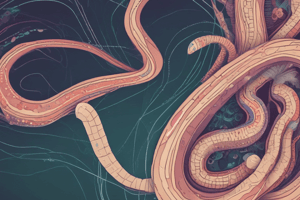Podcast
Questions and Answers
What is a major complication of diverticulitis?
What is a major complication of diverticulitis?
Which dietary factors are associated with the development of diverticulosis?
Which dietary factors are associated with the development of diverticulosis?
Which treatment is considered as complete treatment for bowel obstruction?
Which treatment is considered as complete treatment for bowel obstruction?
What is the primary purpose of a colonoscopy?
What is the primary purpose of a colonoscopy?
Signup and view all the answers
Which symptom is NOT typically associated with bowel obstruction?
Which symptom is NOT typically associated with bowel obstruction?
Signup and view all the answers
What is the main goal of capsule endoscopy?
What is the main goal of capsule endoscopy?
Signup and view all the answers
Which of the following statements about diverticulosis is true?
Which of the following statements about diverticulosis is true?
Signup and view all the answers
In what situation is sigmoidoscopy especially useful?
In what situation is sigmoidoscopy especially useful?
Signup and view all the answers
What is a primary manifestation of irritable bowel syndrome (IBS)?
What is a primary manifestation of irritable bowel syndrome (IBS)?
Signup and view all the answers
What distinguishes Crohn's disease from ulcerative colitis?
What distinguishes Crohn's disease from ulcerative colitis?
Signup and view all the answers
What is an appropriate initial treatment for mild to moderate Crohn's disease?
What is an appropriate initial treatment for mild to moderate Crohn's disease?
Signup and view all the answers
Which of the following is NOT a common symptom of ulcerative colitis?
Which of the following is NOT a common symptom of ulcerative colitis?
Signup and view all the answers
What is one complication associated with Crohn's disease?
What is one complication associated with Crohn's disease?
Signup and view all the answers
In which stage of the low FODMAP diet do individuals avoid high-FODMAP foods?
In which stage of the low FODMAP diet do individuals avoid high-FODMAP foods?
Signup and view all the answers
What are the potential risks for developing irritable bowel syndrome (IBS)?
What are the potential risks for developing irritable bowel syndrome (IBS)?
Signup and view all the answers
Which statement is true regarding the treatment of ulcerative colitis?
Which statement is true regarding the treatment of ulcerative colitis?
Signup and view all the answers
What type of inflammation pattern does Crohn's disease exhibit?
What type of inflammation pattern does Crohn's disease exhibit?
Signup and view all the answers
Study Notes
Promoting Health in Patients with GI Disorders
- Objectives: Correlate clinical manifestations with pathophysiology of selected GI disorders. Discuss medical and nursing management of GI disorders. Develop a teaching plan for patients with GI disorders. Discuss potential diagnostic procedures for patients experiencing GI disorders.
A&P Review
- Oral cavity
- Pharynx
- Esophagus
- Stomach
- Small intestines
- Large intestines
- Rectum
- Pancreas
- Liver
- Gallbladder
A&P Review
- (Repeated)
A&P Review
- (Repeated)
Digestion Review
- (No details provided)
Intestinal Conditions
- Irritable bowel syndrome (IBS)
- Irritable bowel disease (IBD)
- Crohn's disease
- Ulcerative colitis
- Bowel obstruction
- Diverticulosis
- Diverticulitis
Irritable Bowel Syndrome (IBS)
- Presence of abdominal pain/discomfort with altered bowel habits without other causative disease.
- Females > Males (risk)
- Ages 15-49 (risk)
- Family history
- Emotional stress
- Food sensitivities
- Cramping, abdominal pain, bloating, distention, gas, diarrhea, and/or constipation, mucous or bloody stools.
- Lifestyle and dietary modifications.
- Ensure adequate hydration.
- Diarrhea: probiotics, loperamide.
- Constipation: fiber supplements, laxatives.
- Low FODMAP diet (elimination phase: avoid high-FODMAP foods; Reintroduction and maintenance phases).
Crohn's Disease
- Type of inflammatory bowel disease
- Causes inflammation in the deeper layers of GI structures (mouth to anus)
- Inflammation patches followed by healthy tissue patches
- Possible complications: anemia, strictures, fistulas, abscesses, colorectal cancer, osteoporosis.
- Treatment: PO mesalamine, immunomodulators, methotrexate, steroids (for mild-to-moderate); immunomodulators, biologics, surgery (colectomy) for moderate-to-severe cases
Ulcerative Colitis
- Type of inflammatory bowel disease
- Affects the colon and rectum
- Continuous pattern of small sores/ulcers of the superficial mucosa and submucosa.
- Manifestations: bloody diarrhea, fecal urgency, fatigue, increased bowel movements, mucous in stool, nocturnal bowel movements, abdominal pain, malaise, weight loss.
- Complications: colorectal cancer, abscesses, fistulas, incontinence.
- Association with past bacterial or viral infection.
Toxic Megacolon
- A complication that occurs when the colon becomes extremely dilated and thickened.
- Initially treated with suppositories, enemas, PO mesalamine, corticosteroids, probiotics, biologicals then surgery is indicated.
Bowel Obstruction
- Blockage that prevents movement of food or liquids through the small/large intestines.
- Symptoms: Sharp/cramping abdominal pain, bloating and distention of abdomen, diarrhea, inability to pass gas or stool, appetite loss, nausea and vomiting.
- Associated with past abdominal surgery, IBD, or cancer.
- Partial treatment: laxatives, dietary changes.
- Complete treatment: IV fluids, NG tube for decompression, nausea/pain medications, surgery.
Diverticulosis
- Weak areas in the intestinal tract that form small pouches (diverticula).
- Most frequently in the sigmoid colon.
Diverticulitis
- Inflammation or infection of diverticula.
- Manifested by abdominal pain, nausea/vomiting, fever.
- Possible complications: abscesses, blockage, fistula formation, peritonitis , perforation, sepsis .
Diagnostic Tests
- Colonoscopy
- Sigmoidoscopy
- Capsule endoscopy
Treatment
- Bowel rest, increased fluid intake (PO/IV), antibiotics, pain management.
Studying That Suits You
Use AI to generate personalized quizzes and flashcards to suit your learning preferences.
Related Documents
Description
This quiz focuses on gastrointestinal (GI) disorders, emphasizing the correlation between clinical manifestations and the underlying pathophysiology. It covers medical and nursing management strategies, diagnostic procedures, and specific conditions like irritable bowel syndrome and Crohn's disease. Enhance your understanding of the anatomy and physiology related to GI health.




